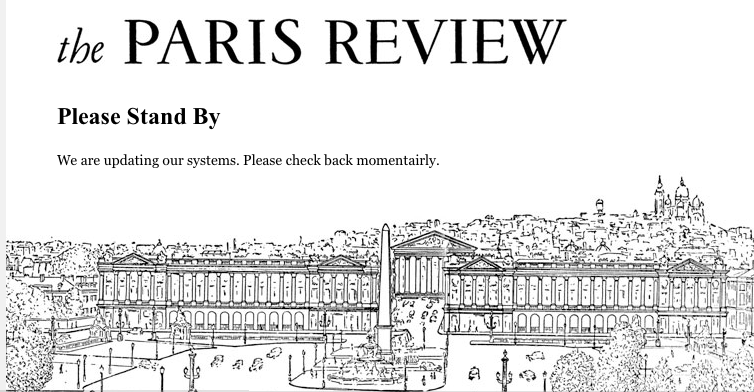Modern Submission Convenience
We just finished our first workshop in my fiction class and now my students and I are talking about revision and what students should consider, if and when they choose to submit writing to literary magazines. I want to make clear to my students that publication isn’t what they should be thinking about right now but I still want them to start to understand what it means to submit work, receive editorial feedback and face rejection or acceptance. Most of the students are, understandably, intimidated by the submission process and what it means to put their work out into the world. Hell, I’m still intimidated by the submission process. For newer writers, it is hard to grasp what editors really want. It’s hard to break yourself of the mindset that you need to worry about what editors want. I went over some of the basic etiquette of submitting–address the proper editors, spell their names correctly, don’t explain your story, don’t ramble, proofread your work, read it aloud, proofread it again, research the magazines where you’re sending your work, read the magazines where you’re sending your work, and more than anything, make sure you’re submitting writing that matters.
When I first started submitting work, there was a ritual to it. I’d print a story out on my dot matrix printer and tear off the perforated edges dotted with tiny holes. I’d consult my Writer’s Market, write a cover letter, address a return envelope affixed with enough postage for a response and send off a story I now know had no shot in hell of ever being published by the likes of those glittery magazines I foolishly hoped would love my work. I am not nostalgic for that time. It was pretty terrible. I did learn, though, that becoming a published writer required patience and effort and sometimes that effort was secretarial.
Dennis Cooper is interviewed in the new issue of the Paris Review (“I’m as interested by what sex can’t give you as by what it can.”)(as is Nicholson Baker)(as is a story by the rad Kerry Howley).
Strawberries Are Delicious
For Short Story Month, Matt Bell has been posting reviews of short stories, guest posts, and quotations from renowned writers on the craft of short story writing. Yesterday, Bell wrote an amazing post about Eduoard Levé’s When I Look at a Strawberry, I Think of a Tongue which appeared in Paris Review 196. You should read both the excerpt (genre indeterminate, sort of, you’ll see) and Matt’s commentary.
Paris Review Blog 404
This is why I like the internet somewhat: Joyce typos caused by quick updates even from the glossies.

Or maybe it’s no typo? Maybe “momentairly” is a more beautiful way to remind you that on the internet part of the fun is the making of whoompers, and sometimes whoompers are the charm.
Anyway, in however long it takes a momentairly to pass (perhaps it is over by the time you are reading this, realtime, shooing this icon to the PR web fodder bin), the Paris Review blog will return with a two week series of guest posts featuring Lydai Davis considering the act of translation, which we could surely use some help with anytime.
The Paris Review is unaccepting previously accepted poems, citing change of editorship. Daniel Nester has the scoop.
Pimp Faulkner
 William Faulkner was a pretty serious guy, and his answers to an interview with The Paris Review in 1956 reflects a severe staunchness and didacticism that, as an enormous fan, I can only afford him. He brought cerebral European modernism to America and rolled it around in dirt. Here’s my favorite reply of his:
William Faulkner was a pretty serious guy, and his answers to an interview with The Paris Review in 1956 reflects a severe staunchness and didacticism that, as an enormous fan, I can only afford him. He brought cerebral European modernism to America and rolled it around in dirt. Here’s my favorite reply of his:
PARIS REVIEW: Then what would be the best environment for a writer?
WILLIAM FAULKNER: […] If you mean me, the best job that was ever offered to me was to become a landlord in a brothel. In my opinion it’s the perfect milieu for an artist to work in. It gives him perfect economic freedom; he’s free of fear and hunger; he has a roof over his head and nothing whatever to do except keep a few simple accounts and to go once every month and pay off the local police. The place is quiet during the morning hours, which is the best time of the day to work. There’s enough social life in the evening, if he wishes to participate, to keep him from being bored; it gives him a certain standing in his society; he has nothing to do because the madam keeps the books; all the inmates of the house are females and would defer to him and call him “sir.” All the bootleggers in the neighborhood would call him “sir.” And he could call the police by their first names.
It’s so perfectly hilarious it seems sarcastic, or even a satire, but in the context of the entire hyper-rational interview, he’s simply following his logic. I love the way he says “social life in the evening” unabashedly with a straight face. It’s official, ‘Faulkner as pimp’ edges out ‘Kafka as clerk’ as my all-time-high mental image/ideal of a writer. The next time I orgasm I’m gonna cough out Yoknapatawpha! and have a flashback to a previous chapter. Bill, my man, slap that ass.


